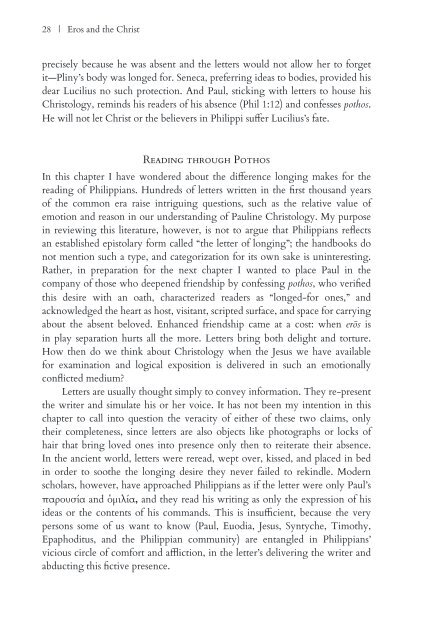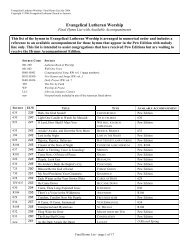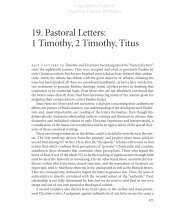Chapter 1 - Augsburg Fortress
Chapter 1 - Augsburg Fortress
Chapter 1 - Augsburg Fortress
Create successful ePaper yourself
Turn your PDF publications into a flip-book with our unique Google optimized e-Paper software.
28 | Eros and the Christ<br />
precisely because he was absent and the letters would not allow her to forget<br />
it—Pliny’s body was longed for. Seneca, preferring ideas to bodies, provided his<br />
dear Lucilius no such protection. And Paul, sticking with letters to house his<br />
Christology, reminds his readers of his absence (Phil 1:12) and confesses pothos.<br />
He will not let Christ or the believers in Philippi suffer Lucilius’s fate.<br />
Reading through Pothos<br />
In this chapter I have wondered about the difference longing makes for the<br />
reading of Philippians. Hundreds of letters written in the first thousand years<br />
of the common era raise intriguing questions, such as the relative value of<br />
emotion and reason in our understanding of Pauline Christology. My purpose<br />
in reviewing this literature, however, is not to argue that Philippians reflects<br />
an established epistolary form called “the letter of longing”; the handbooks do<br />
not mention such a type, and categorization for its own sake is uninteresting.<br />
Rather, in preparation for the next chapter I wanted to place Paul in the<br />
company of those who deepened friendship by confessing pothos, who verified<br />
this desire with an oath, characterized readers as “longed-for ones,” and<br />
acknowledged the heart as host, visitant, scripted surface, and space for carrying<br />
about the absent beloved. Enhanced friendship came at a cost: when erōs is<br />
in play separation hurts all the more. Letters bring both delight and torture.<br />
How then do we think about Christology when the Jesus we have available<br />
for examination and logical exposition is delivered in such an emotionally<br />
conflicted medium?<br />
Letters are usually thought simply to convey information. They re-present<br />
the writer and simulate his or her voice. It has not been my intention in this<br />
chapter to call into question the veracity of either of these two claims, only<br />
their completeness, since letters are also objects like photographs or locks of<br />
hair that bring loved ones into presence only then to reiterate their absence.<br />
In the ancient world, letters were reread, wept over, kissed, and placed in bed<br />
in order to soothe the longing desire they never failed to rekindle. Modern<br />
scholars, however, have approached Philippians as if the letter were only Paul’s<br />
παρουσία and ὁμιλία, and they read his writing as only the expression of his<br />
ideas or the contents of his commands. This is insufficient, because the very<br />
persons some of us want to know (Paul, Euodia, Jesus, Syntyche, Timothy,<br />
Epaphoditus, and the Philippian community) are entangled in Philippians’<br />
vicious circle of comfort and affliction, in the letter’s delivering the writer and<br />
abducting this fictive presence.




